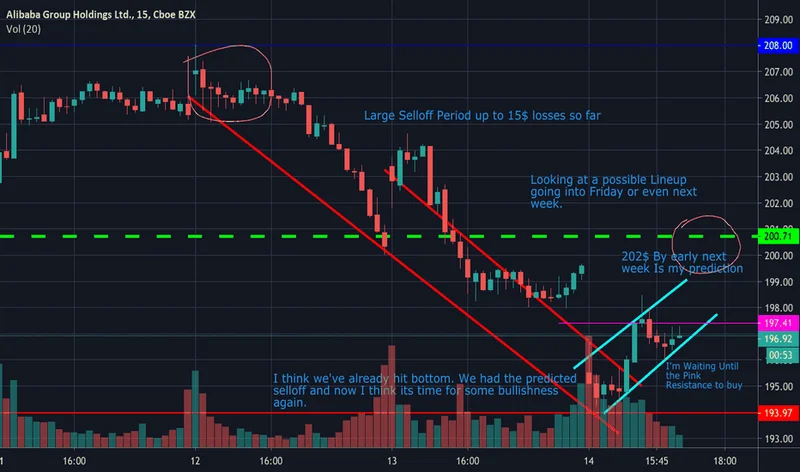BABA Stock Downgrade: Price Target Trims and White House Concerns
AI's Alibaba Call: A Data-Driven Reality Check?
Alibaba (BABA) has been on a tear this year, climbing over 80%. The narrative? AI cloud growth and faster delivery services are fueling a resurgence. But before you jump on the bandwagon, let's dig into what TipRanks' AI Analyst, Rina Curatex (powered by OpenAI-4o, no less), is saying. It's not exactly a ringing endorsement. Curatex downgraded BABA to "Neutral" and trimmed the price target to $176, a mere 8% upside from current levels. Wall Street, in contrast, is still shouting "buy," projecting a nearly 24% jump. That's a sizable discrepancy.
So, what's the AI seeing that the human analysts are missing? TipRanks' AI Stock Analysis gives Alibaba a score of 69 out of 100. Strong financials, yes, but offset by "bearish technical indicators and valuation concerns." It’s a mixed bag, to say the least.
Cracks in the Narrative
The AI points to growth in AI and cloud services as a positive. Q1 FY26 revenue hit 247.7 billion yuan (that's $34.6 billion for those of us who think in dollars), with cloud sales up 26% year-over-year to 33.4 billion yuan. Partnerships, like the one with SAP, are expanding Alibaba's global reach. All good, right?
Not so fast. Weak free cash flow is a major red flag. The AI attributes this to high spending, which, if sustained, could limit Alibaba's financial flexibility. The quick-commerce business is still bleeding money, a casualty of intense competition in the fast-delivery arena. This is where I start to get concerned. A company can't spend its way to prosperity forever; at some point, you need to see returns. And rising debt? That's just adding fuel to the fire.

The Financial Times is reporting that Alibaba provided tech support for Chinese military operations against targets in the US. The White House says Alibaba gives the Chinese government and PLA access to customer data including IP addresses, WiFi information, and payment records, as well as various AI-related services. White House says Alibaba provides tech support to Chinese military; shares fall By Investing.com Alibaba denies these reports.
The Human Element: A Methodological Critique
But let's step back for a moment. How does TipRanks' AI Stock Analysis actually work? It's an automated, data-driven evaluation based on key performance metrics, but what metrics? Are they weighted appropriately? Are they lagging or leading indicators? The article mentions that the AI-driven rating combines insights from multiple models, including OpenAI’s GPT-4o and Google’s Gemini. That sounds impressive, but it also introduces a layer of complexity. Are these models truly independent, or are they reinforcing each other's biases? This is the part of the report that I find genuinely puzzling. The AI is only as good as the data it's fed and the algorithms it uses. If the data is flawed or the algorithms are biased, the output is garbage, no matter how sophisticated the AI.
Analysts, on the other hand, remain overwhelmingly bullish. Nineteen "Buy" ratings versus two "Hold" ratings. The average price target? $198.21, implying a potential 24% upside. That's a massive divergence from the AI's outlook. Which begs the question: are human analysts factoring in something the AI is missing, or are they simply caught up in the hype? Could it be that the human analysts are overweighting the potential upside of AI and cloud growth, while downplaying the risks of weak cash flow and rising debt? It's a possibility.
The RSI (Relative Strength Index) is currently at 42.94, which suggests that the stock is in neutral territory, indicating that it is neither overbought nor oversold at this moment. Support for Alibaba is calculated at $130.06, which may provide a safety net if the stock continues to decline. Conversely, resistance is identified at $170.55, which will be a critical level to watch for any potential recovery.
AI's Sober Second Thought
The AI's downgrade isn't a death knell for Alibaba, but it's a much-needed dose of reality. It's a reminder that even in the age of AI, fundamental financial principles still matter. Growth is great, but it needs to be profitable and sustainable. Weak cash flow and rising debt are not sustainable. Wall Street's optimism might be justified, but it's worth taking a closer look at the underlying data and asking some hard questions. The AI's call, while perhaps conservative, forces us to do just that.
